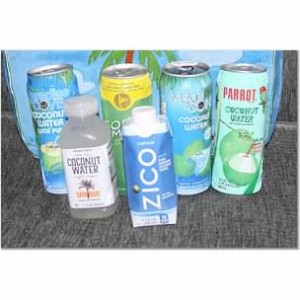When I visited Trinidad and Tobago on my honeymoon, roadside vendors would slice the top off a fresh coconut with a machete, stick a straw in it and hand it over. It was bliss! I haven’t found a store-bought version that even comes close. Yet these days, coconut water seems to be everywhere.
Not to be confused with coconut oil or coconut milk, coconut water seems to be “the” drink of the moment. It has been purported to prevent aging, improve cardiovascular health, manage stress, boost energy and digestion… along with a host of other health claims. But is it really all it’s cracked up to be? And is it just a beverage, or does it have other uses as well?
Coconut water – what is it good for?
The first thing I did was go out and buy a variety of different brands of coconut water. To my horror, when I got home, I noticed that many of the cans of coconut water were sweetened! With added sugar! Coconut water is naturally sweet, so why? One contained sea salt (not good for those trying to cut down on sodium), and all but one contained a mystery ingredient called sodium metabisulfite, a “disinfectant and preservative agent” which is also used as a bleaching agent in sewage plants. Doesn’t sound so healthy anymore. Usually, I am so meticulous about reading labels, but this time, naively, I saw “coconut water” and figured that’s all that was inside. So my advice to you: read your labels carefully before buying and do your research!
10 uses for coconut water
- As a substitute for water when cooking.I’d read online that you could substitute coconut water for water when making rice. I didn’t have any rice in my pantry, so I used quinoa instead. The coconutty flavor was very subtle and added a nice taste to the grain. My kids ate it right up.Takeaway: Sub it for water or chicken broth in your favorite recipes.
- Use in fruit shakes. I make myself fruit and veggie shakes with either almond milk or soy milk. Upon the recommendation of many online articles, I opted to use coconut water instead. Unsweetened, no added ingredients. And it was, in my opinion, a big FAIL. Blecch! I’m thinking that the milkiness of the other beverages helps make the spinach in my shake pretty much disappear, but the coconut water does not.My suggestion: seek out a specific fruit shake recipe that uses coconut water.
- As a replacement for sports drinks. I’m convinced that people like to drink Gatorade and Powerade because they are basically grown-up versions of Kool-Aid. But they are filled with sugar, dyes… even oil! Coconut water has been touted as a great way to replenish your electrolytes; naturally, it contains potassium, magnesium, phosphorus and calcium. Now aside from a spin class twice a week at my gym, I can’t really claim to be an athlete. In fact, the only time I reach for an electrolyte drink is if I’ve had food poisoning or a nasty sickness. But my daughter loves those sugary sports drinks (again, the Kool-Aid factor), so when she asked for a taste of my coconut water, I said sure. And she promptly gagged and spit it out.So I guess the takeaway from this is, if you like the taste, go for it.
- As a facial wash. I chose to wash my face in the morning when I woke up, not sure if coconut water could really wash away my makeup at night. Well, I can’t say it really made my face feel clean in the morning, either.My advice: Use a facial wash instead.
- As a moisturizer. I found coconut water feels a tad more sticky than moisturizing. I used 100% pure with no additives but personally did not care for the feeling. Reached for my moisturizer to put on top of the sticky film.Stick to your regular moisturizer.
- As a facial scrub. I came across a recipe for a coconut water facial scrub calling for me to mix 1 TBSP coconut water with dry lentils, then scrub on my face for two minutes. Seriously? I have no desire to clog my bathroom sink with lentils and I’m not interested in washing my face over the garbage disposal in the kitchen.So I skipped this one.
- As a pre-shampoo conditioning treatment.I was pretty skeptical about this, but tried it two different times, massaging the coconut water into my hair before shampooing and conditioning. To my surprise, my hair felt really smooth and soft after blowdrying. Considering how little I used, I’d say it cost me about 20 cents – way cheaper than conditioning treatments I’ve used at salons!Coconut water softened and smoothed my hair!
- In place of water when steaming vegetables. This was certainly easy enough to do. After steaming the vegetables, I didn’t notice that they tasted any different. I can’t find any information on what the benefit is, but I know that coconut water is very high in potassium. I was steaming carrots and broccoli which contain approximately 650mg of potassium per serving (an average banana contains 100g). One small bottle of Zico Pure Premium coconut water provides 490mg of potassium. But how much is absorbed into the vegetables that are steamed? I’m not sure and at an average of $2-3 per bottle, it’s something to consider.Stick to steaming veggies with water.
- As an acne treatment. Several posts I read recommended dabbing coconut water on acne spots. Stress has caused my normally acne-free skin to break out, so I tried this treatment. Unlike benzoyl peroxide cream, I found that coconut water is tingling but not drying or irritating.But as for ridding my skin of the dreaded breakout… I can’t say that I saw any results.
- Weight loss. Coconut water is touted as “the” drink for weight loss. But a small bottle of coconut water (about half the amount I would drink after an intense workout) is 70 calories. So wouldn’t water, which has zero calories, be a better option? Or, if you really feel you need the electrolytes, zero calorie electrolyte water? Plain water has fewer calories than coconut water.



Leave a Reply